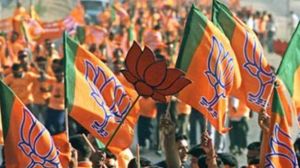Over to the people146;s dictator
The final draft of Nepal8217;s interim constitution gives overweening powers to the prime minister. This does not bode well for Nepal8217;s transition to democracy

It took almost a fortnight for Prime Minister G.P. Koirala to realise that he would be no less than an absolute dictator once the interim constitution finalised by the seven parties belonging to the ruling coalition and the Maoists came into force. From a willing 8216;dictator8217; then, he has tried to appear as a reluctant 8216;dictator8217; now. 8220;I am not too happy with the amount of power the PM will be exercising under the interim constitution8221;, he said recently.
There was no way Koirala could have ignored the criticism of the finalised draft. Hundreds of thousands of people descended on the streets during the 19 days that shook Nepal in April. And the international community had extended its prompt approval to the fall of the royal regime. The finalised draft has come as a setback to both. The Communist Party of Nepal-United Marxist Leninist CPN-UML has accused the Koirala coterie of foul play 8212; that the agreed draft was tampered with to make Koirala the people8217;s dictator.
Not only will he be acting both as head of state and head of government, but there will also be a committed legislature and committed judiciary under the provisions of the interim constitution. And the only circumstance that could remove the prime minister is either his resignation or death.
But will Koirala8217;s late realisation of the dangers of this situation be of any use?
The Communist party of Nepal-Maoists, which is almost dictating the current politics in Nepal, does not see anything wrong with the interim constitution. For Maoists, it8217;s clearly an ideological victory as they believe in executive supremacy, not separation of powers. Then, given Koirala8217;s age and state of health, Maoist supremo, Prachanda, will be a strong claimant for the post in the interim phase.
No one knows when the interim phase is going to begin, but it does not look very far away. The promulgation of the constitution will herald that phase. It will be followed by the inclusion of the Maoists in the interim government headed by Koirala with the existing seven parties continuing in it. As per the agreement, once the interim constitution comes into effect, the House of Representatives will be dissolved, and a new House with all the existing parliamentarians plus the Maoists nominated by the party leadership will become members of the 330-member interim Parliament.
But the interim constitution, in clear violation of the right to equality, asserts that those who did not join the April uprising will not be eligible for membership of the interim Parliament. This has become a major bone of contention in the legal community as the monopoly of eight parties in the interim Parliament goes against the letter and spirit of the right to equality. The Nepal Bar Association has asked the eight parties to review and amend the constitution, but it is doubtful that the parties will agree. But strangely, this has almost become a non-issue as far as the civil society and human rights groups are concerned. In fact, prominent human rights leader, Padmaratna Tuladhar, has gone to the extent of threatening that no other political parties other than the eight which supported the April uprising will be allowed to hold political activities. And the government with all its security agencies 8212; army, civil police and the Armed Police Force 8212; have failed to give protection to non-ruling parties.
Moreover, the police and APF, with handpicked leadership and arbitrary sidelining of several senior officials, are acting more like pocket organisations of the home minister than as representatives of the authority of the state. With the government8217;s decision to keep the Nepal Army away from elections, will the police and APF contribute in the conduct of free and fair elections scheduled in June? The Maoists still insist that while they are ready to deposit their arms in the designated cantonment under UN supervision, they will retain the keys.
Sadly, there has been no visible change of behaviour on the part of the Maoist cadres at the district and regional level as extortion, illegal detention and torture continue despite the leadership8217;s plea to all not to doubt the sincerity behind the latest political journey towards a competitive democracy.
But Maoists8217; continued access to arms, along with demoralised and partisan security agencies of the state, and especially an interim government headed by an 8216;absolute prime minister8217; with a committed interim Parliament and committed judiciary 8212; all indicate that for Nepal, the promised destination of peace, democracy and prosperity is still far away.
- 01
- 02
- 03
- 04
- 05































